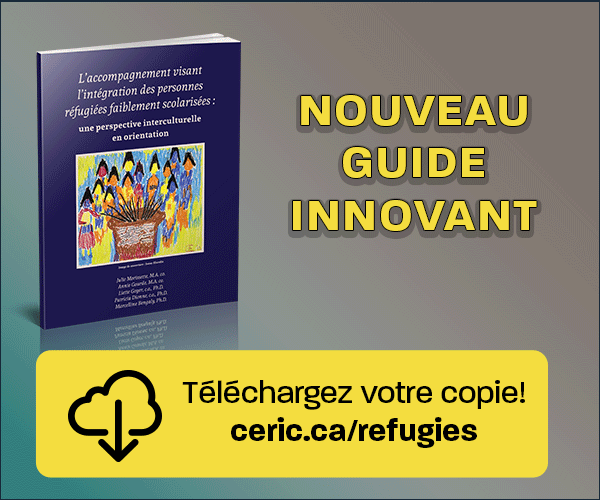Corrélations de la satisfaction professionnelle des travailleurs immigrés
Mots-clés :
la satisfaction professionnelle, travailleurs immigrés qualifiés, les attitudes au travailRésumé
Research in the career development field has primarily focused on the barriers immigrant workers face when integrating into the workforce and how they can overcome these barriers. There have been few studies investigating contextual factors that impede workplace integration. To address this gap, the current study surveyed employed immigrant workers across Canada about their job satisfaction, in relation to their bicultural competence, English language usage, social support, and workplace attitudes. A correlational analysis revealed significant correlations between bicultural competence, English language usage, social support, workplace attitudes and immigrant worker job satisfaction. Results from this study highlighted the importance of considering contextual influences such as workplace attitudes in developing research and practices to support the successful employment integration of immigrant workers.
Références
Arthur, N. (2012). Career development and international transitions. In M. Watson & M. McMahon, Career development: Global issues and challenges (pp. 93-110). New
York, NY: NOVA.
Chen, C. P. (2008). Career guidance with immigrants. In J. Athanasou & R. Van Esbroeck (Eds.), International Handbook of Career Guidance (pp. 419-442). Amsterdam, NL: Springer.
David, E. J., Okazaki, S., & Saw, A. (2009). Bicultural self-efficacy among college students: Initial scale development and mental health correlates. Journal of Counseling Psychology, 56, 211-226. doi:10.1037/a0015419
Dawis, R. V. (2005). The Minnesota theory of work adjustment. In S. D. Brown & R. W. Lent (Eds.), Career development and counseling: Putting theory and research to work (pp. 3-23). New York, NY: Wiley.
Dawis, R. V., England, G. W., & Lofquist, L. H. (1964). A theory of work adjustment. (Minnesota Studies in Vocational Rehabilitation: XV). University of Minnesota: Industrial Relations Center.
James, K., Lovato, C., & Cropanzano, R. (1994). Correlational and known-group comparison validation of a workplace prejudice/discrimination inventory. Journal of Applied Social Psychology, 24(17), 1573–1592. doi:10.1111/j.1559-1816.1994.tb01563.x
Koert, E., Borgen, W. A., & Amundson, N. E. (2011). Educated immigrant women workers doing well with change: Helping and hindering factors. The Career Development Quarterly, 59(3), 194-207. doi:10.1002/j.2161-0045.2011.tb00063.x
Ng, T. W., & Sorensen, K. L. (2008). Toward a further understanding of the relationships between perceptions of support and work attitudes a meta-analysis. Group Organization Management, 33(3), 243-268. doi:10.1177/1059601107313307
Nguyen, A. D., & BenetMartínez, V. (2012). Biculturalism and adjustment a meta-analysis. Journal of Cross-Cultural Psychology, 44(1), 122-159. doi:10.1177/0022022111435097
Salamonson, Y., Attwood, N., Everett, B., Weaver, R., & Glew, P. (2013). Psychometric testing of the English Language Acculturation Scale in first-year nursing students. Journal of Advanced Nursing, 69(10), 2309–2316. doi:10.1111/jan.12098
Somerville, K., & Walsworth, S. (2010). Admission and employment criteria discrepancies: Experiences of skilled immigrants in Toronto. Journal of International
Migration and Integration, 11(3), 341-352. doi:10.1007/s12134-010-0138-4
Spector, P. E. (1985). Measurement of human service staff satisfaction: Development of the job satisfaction survey. American Journal of Community Psychology, 13(6), 693-713. doi:10.1007/BF00929796
Waight, J., & Madera, J. M. (2011). Diversity training: Examining minority employees’ organizational attitudes. Worldwide Hospitality and Tourism Themes, 3(4), 365-
doi:10.1108/17554211111162471
Wong, L., & Guo, S. (2011). Multiculturalism turns 40: Reflections on the Canadian policy. Canadian Ethnic Studies, 43(1), 1-3. doi:10.1353/ces.2011.0013
Zimet, G. D., Dahlem, N. W., Zimet, S. G., & Farley, G. K. (1988). The multidimensional scale of perceived social support. Journal of Personality Assessment, 52(1), 30-41.
doi:10.1207/s15327752jpa5201_2

Téléchargements
Publié-e
Comment citer
Numéro
Rubrique
Licence

Cette œuvre est sous licence Creative Commons Attribution - Pas d'Utilisation Commerciale - Pas de Modification 4.0 International.











